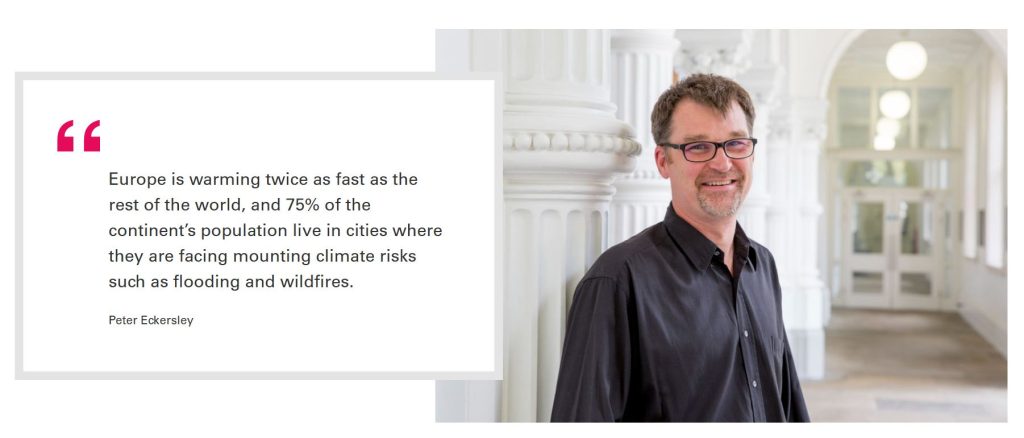European cities are not prepared to effectively address climate change risks, according to a new study which found that nearly 70% of their climate adaptation plans contain significant inconsistencies.
The research, published in the journal Nature Climate Change, identifies an ‘adaptation gap’ which suggests that European cities are struggling to turn climate planning into meaningful action.
A team of international experts, including Associate Professor Peter Eckersley from Nottingham Business School, part of Nottingham Trent University, analysed 167 local climate adaptation plans from the 27 EU member states plus the UK to see how well they addressed five key areas.
These included how well the plans matched local climate risks with their goals, whether the risks facing different sectors were addressed with the right actions, and how much they considered the needs of vulnerable groups. The study also explored whether these groups were included in monitoring and evaluation, and if they had a say in the planning process.
While half of the plans (52%) fully align environmental risks with corresponding actions, the remaining 48% identify risks but do not follow up with respective measures.
Findings also show that 49% of sector-specific measures, particularly greening and water-related measures, are implemented without any prior risk evaluation of the local context.
Just 1% effectively engaged vulnerable communities, such as the elderly, low-income, and ethnic minorities – signalling a widespread failure to integrate social equity into climate strategies.
Overlooking vulnerable groups was most notable among newer plans from Eastern European cities, whereas older plans in Northern Europe and the UK demonstrated weak alignment between climate risks and goals.

Associate Professor and lead author, Diana Reckien, University of Twente, said: “Cities often tick the boxes for having adaptation plans, but when you look closely, many plans are misaligned or incomplete, especially when it comes to protecting vulnerable populations and goals. This lack of consistency not only limits adaptation effectiveness but increases the risk of maladaptation, where actions may unintentionally worsen vulnerabilities or waste resources.”
Dr Peter Eckersley, Associate Professor in Public Policy and Management at Nottingham Business School – a triple crown accredited business school and United Nations Principles of Responsible Management Education (PRME) Champion – co-authored the paper.
He said: “Europe is warming twice as fast as the rest of the world, and 75% of the continent’s population live in cities where they are facing mounting climate risks such as flooding and wildfires.
“Having a plan is not enough, it must go beyond paperwork. Without coherence, inclusion, and evidence-based strategies, the ‘adaptation gap’ will widen, because cities’ intentions won’t translate into impact and our most vulnerable communities will be left behind.
“We urge policymakers to improve the consistency of adaptation plans by making sure that risk assessments guide all planned actions, clearly addressing social vulnerabilities, and setting up open and transparent processes for participation and monitoring.”
This research is part of the EURO-LCP Initiative which offers a new standard for evaluating climate plans and has created useful tools to help close the gap in climate adaptation, supporting cities in creating more resilient and fairer futures. Resources can be accessed online.
